The Middle East stands on the brink of a potential wider conflict as Iran has directly informed Israel of its intention to attack, following the assassination of Hamas leader Ismail Haniyeh in Tehran on July 31. Israeli Foreign Minister Israel Katz confirmed receiving this warning through diplomatic channels. In response, Israel is maintaining a low alert level for civilians but is preparing for all scenarios, including considering a ‘preventive strike’ if there is certainty of an imminent attack.The United States has taken a firm stance, with Secretary of State Antony Blinken warning Iran that it will lose the ability to interact with the US if it launches a strike comparable to the one in April. Blinken has also engaged with G7 counterparts and regional allies to discuss de-escalation efforts. US President Joe Biden has convened the National Security Council to monitor the situation.Despite these diplomatic efforts, the situation remains volatile. Iran’s Foreign Ministry spokesperson, Naser Kanani, stated that ‘No one has the right to doubt Iran’s legal right to punish the Zionist regime’. The Iranian government has called an emergency meeting of the Organization for Islamic Cooperation to justify its ‘right to retaliation’.Israel has taken military action against Hezbollah, a key Iranian ally, targeting a commander in southern Lebanon. This has further heightened tensions, with Hezbollah leader Hassan Nasrallah threatening to respond with force.The international community is working to prevent further escalation, with French President Emmanuel Macron and Jordanian King Abdullah II calling for avoiding a ‘regional military escalation’. However, as the region braces for potential conflict, the coming days will be crucial in determining whether diplomatic efforts can succeed in averting a wider war.
Key points
- Iran has directly informed Israel of its intention to attack in retaliation for the assassination of Hamas leader Ismail Haniyeh.
- The United States has warned Iran of severe consequences if it proceeds with an attack on Israel.
- Israel is considering a preventive strike while maintaining a low civilian alert level.
- International diplomatic efforts are intensifying to prevent further escalation in the region.
Contradictions👾While some sources indicate that Iran has decided to attack Israel, others suggest that the exact form and timing of Iran’s response remains uncertain.
👾The Israeli military states there are no changes in civilian directives, yet reports suggest Israel is preparing a bunker for leadership in Jerusalem.
